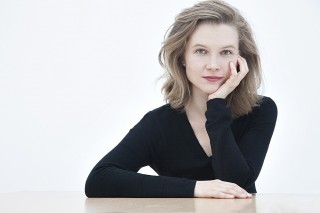Title

Mirga Grazinyte-Tyla
(Photo by Frans Jansen)At 29, Lithuanian conductor Mirga Gražinytė-Tyla has already accumulated both the experience and accolades of conductors many years her senior. Her somewhat untraditional path has led from studying painting to choral directing to coaching opera in Heidelberg, and, most recently to New York, where she makes her Juilliard—and New York conducting—debut this September.
Body
In addition to being named a Dudamel Fellow with the Los Angeles Philharmonic and recently being promoted to the position of associate conductor, Gražinytė-Tyla (her full name is pronounced MEER-gah grah-zhee-NEE-teh tee-LA) won the 2012 Salzburg Festival Young Conductors Award and has served as music director of the Salzburg Landestheater and the City of Birmingham Symphony Orchestra. Jetting around the globe seems neither to have exhausted her nor gone to her head. On the contrary, as she demonstrated in an early morning phone interview with The Journal this summer, she approaches every day with a deep respect for her colleagues, passion for the repertoire she chooses to perform, and seemingly boundless energy.
Gražinytė-Tyla’s program with the Juilliard Orchestra—the ensemble’s season opener, on September 26—will begin with the U.S. premiere of Fires, a 2010 work by the celebrated Lithuanian composer Raminta Šerkšnyte˙ (b. 1975), with whom she has become friends. The work was commissioned by conductor Mariss Jansons for a project that involved pairing Beethoven symphonies with new works for the Bavarian Radio Symphony Orchestra; Fires was to be played before the Fifth. “The funny story is, Raminta was about to say no to this great opportunity as she did not feel in harmony with the philosophy [of the project], but then her friends convinced her to do it,” Gražinytė-Tyla said.
It all worked out, of course. “Raminta has always been, I think, obsessed with the [interval of a] minor third. Through this, she found a great relationship between her own ideas and Beethoven’s. In Fires, there is a fight between major and minor thirds and the whole piece ends with the famous four-note motif that comes at the very beginning of the Beethoven. It’s like the story of the birth of Beethoven’s Fifth.”
As an added twist, the Juilliard program does not continue into Beethoven’s Fifth, but rather into his Third Piano Concerto (1803), which shares the alternately turbulent and triumphant nature of the symphony, as well as the key of C minor. “We wanted to find a piece for one of the great soloists from Juilliard,” Gražinytė-Tyla said. “I’m so happy about this combination!” (The student soloist will be chosen in a competition after the school year begins.)
The evening will end with the Berlioz Symphonie fantastique (1830), which Gražinytė-Tyla describes as “one of the very biggest masterpieces that we have for the orchestra.” One of the first Romantic examples of program music, its groundbreaking scoring vigorously depicts scenes as varied as a duet between herdsmen in the hills, the dancing of witches, and an opium-infused nightmare about being beheaded. “It will be a very exciting journey to discover it together,” she said.
And for those in the orchestra who have already had the opportunity to perform these works, Gražinytė-Tyla hopes this concert will afford them new perspective. She mentioned a fondness for the experience of returning to works she has interpreted in the past. “Coming back [to pieces] is such an interesting process. I remember going through it once with the overture to Fledermaus by Johann Strauss. I had studied the piece years earlier and then I was going to have another performance of it. I thought, ‘I know the piece well!’ and just had a short look at it before going to the rehearsal. And in that moment, I understood that I had known the piece. But it’s got to be about knowing it here and now, with all the new experiences you’ve had in between. It’s about discovering what it means to you and how it speaks to you now. Every single moment in your life, each piece will be a different experience.”
With her many roles, it is no surprise that young conductors have begun coming to Gražinytė-Tyla for advice, though she’s occasionally their junior. She says that she’s certainly looking forward to meeting the conducting students at Juilliard, though she cautioned slyly that she doesn’t yet see herself “as somebody who knows all the secrets and can give advice for every situation. I’ve learned from my young colleagues that it’s not only about what I can give to them, but that they have a lot to teach me.”




